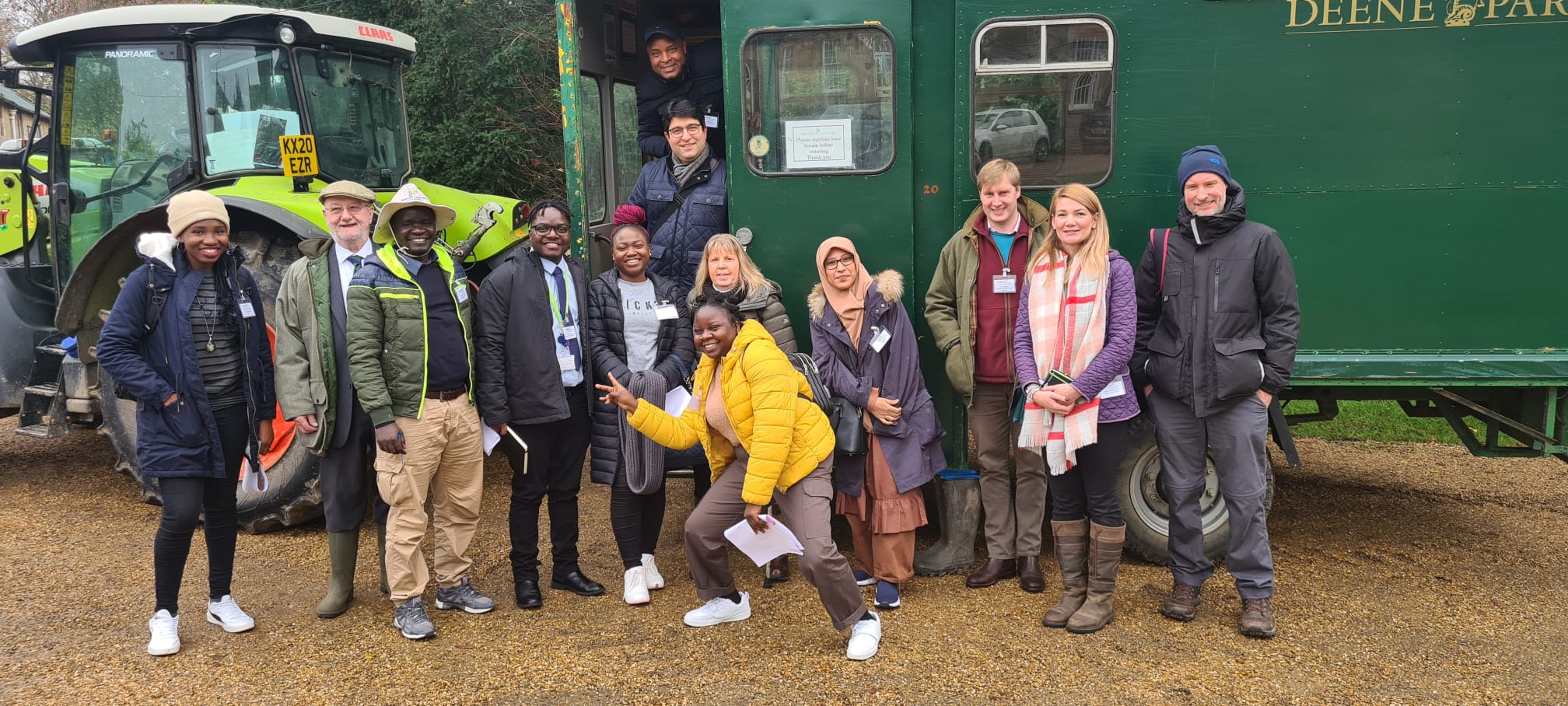
Agricultural students from developing countries see the benefits of adding value and tapping into natural resources on Northamptonshire estate, Deene Park
Six Masters students from Indonesia, Malawi, Nigeria, and Uganda visited the 3,000-acre mixed Deene Park, Northamptonshire in November as part of their scholarship studies with the Marshal Papworth Fund, an agricultural development charity managed by the East of England Agricultural Society.
The students, and members of the Marshal Papworth Fund committee, were shown around Deene Park by Mark Coombs, estate manager of seven years. Introducing the basic ethos of the estate, Mark said: “We are a diversified rural estate; the bedrock of the estate is agriculture, but we wanted and needed to explore diversified enterprises to tap into local footfall.”
Deene Park, which has been in the Brudenell family for over 500 years, also includes a 7,000-acre estate in the Welland Valley, with a total of 26 farms across the two estates. Mark continues: “We really encourage our tenant farmers to diversify and add value to what they do, supplementing income from straight agriculture in this way. We have an open-door policy with our tenants to actively encourage new ideas.”
Jennifer Nkechi Oseji, who received a scholarship for an MSc in Food Security and Development at Reading University and is from Nigeria, questioned if this approach could work with farm co-operatives in Africa, with Mark responding: “Yes, sharing ideas and resources in the same way to help shorten the supply chain would work really well.”
Mark introduced the students to Deene Park’s approach to maximising natural resources on the estate, investing heavily in solar to produce electricity to power redundant farm buildings that they are developing into business units and offices, selling the electricity to these businesses at a reduced rate whilst still making a healthy profit. Natural resources are also harnessed elsewhere on the estate, with geothermal rods sunk into the ground at the new Cardigan Business Units, a series of dilapidated farm buildings that are being turned around into a suite of offices.
Talking about the historic parkland surrounding the main house, Mark highlighted the importance of multiple functions – being grazed by sheep before a crop of silage is taken in early summer, and then the land turned around for events in the summer. A small Beef Shorthorn herd also provides complementary grazing, as well as bringing in stewardship funding as a traditional breed.
Patrick Phiri, studying for an MSc in Crop Production at Writtle University College, and from Malawi, said: “Deene Park is taking the approach of almost creating a circular economy on the estate, with solar and geothermal investment protecting the estate and its tenants from future fluctuations in energy prices, whilst using what the farm has available, in this case, some redundant farm buildings, to help add value to both the estate and tenant businesses. I think we can all learn something here about the benefits of working together with our neighbours in this way.”
A key take home from the farm visit was also the importance of getting the right people involved, whilst sharing knowledge wherever possible, something that Mark himself learnt on a course with the Worshipful Company of Farmers 20 years ago: “Get the right people in for the job, ask the experts, and get off your farm at least once a month to share ideas.”
Tom Arthey, chairman of the Marshal Papworth Fund committee, said: “It was great to hear Mark speak so passionately about many values that are intrinsic to the Fund, most importantly knowledge exchange, which really is a core principle of the Marshal Papworth Fund. Our ‘growing out of hunger’ vision depends on our scholars sharing their new knowledge, as well as shared experiences, whilst Mark’s inspirational discussion surrounding maximising natural resources and working together to shorten supply chains and add value to agricultural enterprise also sparked interest amongst our students.”
“Thank you to Mark and the Deene Park team for their time, we know from experience just how powerful these visits are; it may not seem it from the outset but there are a remarkable number of similar challenges facing farmers across the UK and developing countries, and getting on to farms in this way, chatting to the farmers and estate managers, is so powerful to help our students overcome them.”
Mark finished: “Management is managing change, and always having a plan B. We are always looking for the next avenue to add value to the business, and this is something that I know you can do in your communities and enterprises too.”
In the afternoon, the group enjoyed a traditional Christmas turkey lunch, courtesy of New Lodge Farm, Bulwick, where Simon and Sarah Singlehurst shared their experience of diversifying their own enterprise with a popular farm shop, café and campsite.
Sarah said: “We really enjoyed hosting the students at New Lodge Farm, where we were able to share the history of the farm with the students and explain how we have diversified in recent years to ensure that the farm could survive and ensure its sustainability.”
Having explained how the Singlehursts started in the butchery and farmer’s market business, they were able to illustrate how important the link from ‘farm to fork’ is and how opening the farm shop, café and campsite has enabled these three different aspects of their business to support each other.
New Lodge Farm has both diversified and evolved over recent years and Sarah explained how, as with Mark at neighbouring Deene Park, their emphasis on recycling and sustainability through solar panels, biomass boiler and an on-site sewerage system will help to future proof the business from fluctuations in energy costs whilst protecting the environment.
Sarah continued: “We are able to continue to breed our own pure bred Aberdeen Angus cattle herd and sheep still graze the permanent pastureland with nitrogen self-fixing lucerne crops rotating round the fields, to produce valuable winter feed for the cattle.”
“Hopefully, the many aspects of the business at New Lodge Farm have enabled the students to see how diversification helps to make a family farm both profitable and sustainable.”
The six scholarship recipients secured places at Harper Adams University, Reading University, and Writtle University College, where they are studying a range of courses including Crop Production, Integrated Pest Management, Agricultural Sciences and Production Systems, Food Security and Development, and Agriculture and Development.
The Marshal Papworth Fund was formed in 2001 with funds bequeathed by the late Marshal Papworth, an East Anglian farmer, and works towards helping developing countries across the world in ‘growing out of hunger.’

